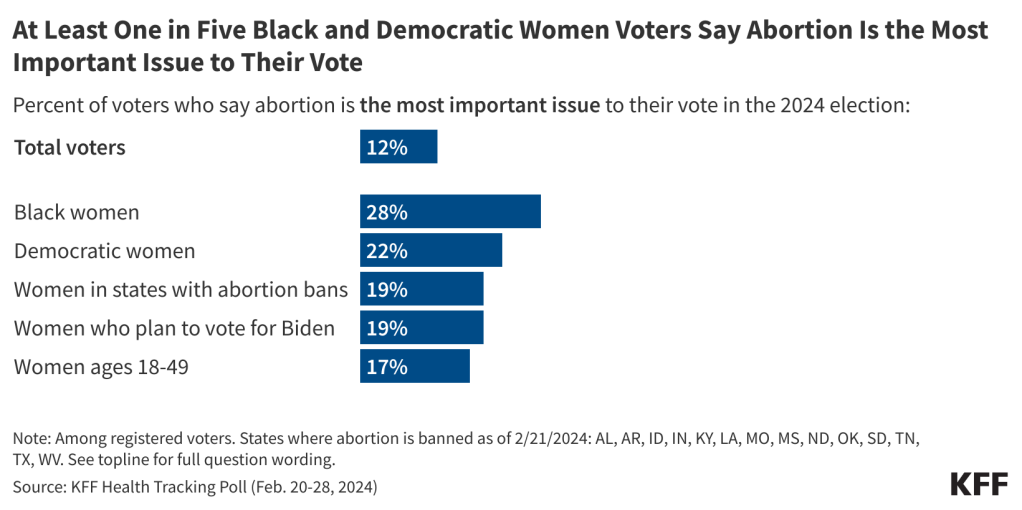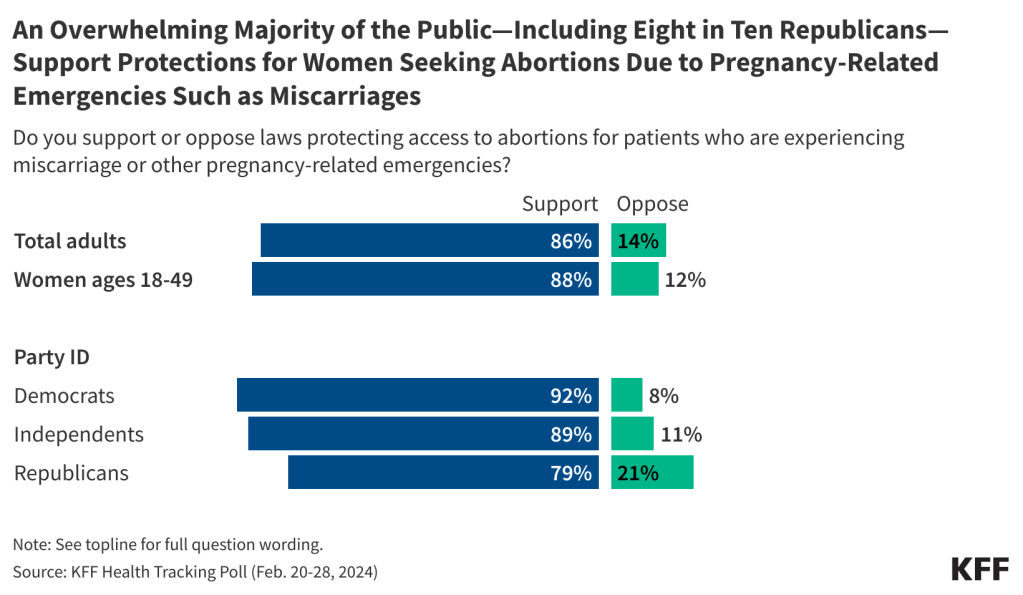
The independent source for health policy research, polling, and news.
1 in 8 Voters Say Abortion Is Most Important to Their Vote: They Lean Democratic, Support Biden, and Want Abortion to Be Legal
Most of the Public Opposes a 16-Week Ban on Abortion, Though Most Republicans Favor It; Majorities Across Party Lines Support Abortion for Pregnancy-Related Emergencies
About 1 in 8 voters (12%) now say that abortion is the most important issue for their vote in the 2024 elections, highlighting how the issue could motivate groups of voters who largely say abortion should be legal in all or most cases, a new KFF Health Tracking Poll finds.
The issue resonates with certain key groups of women voters. More than 1 in 4 Black women voters (28%), and about a fifth of Democratic women (22%), women who live in states where abortion is banned (19%), women voters who plan to vote for President Biden (19%), and women of reproductive age (18-49) (17%) identify as abortion voters.
Overall, the majority of abortion voters say abortion should be legal in all or most cases. This is a significant shift from elections prior to the Supreme Court’s decision to overturn Roe v. Wade, when abortion voters were largely those who identified as pro-life.

About half (48%) of this election’s abortion voters say that they would vote for President Biden if the election were held today, nearly double the share (26%) who say that they would vote for former President Trump. This group says they voted for Biden over Trump by a similar margin in 2020, though about 1 in 5 say they did not vote in that election.
At the same time, 43% of Republicans overall say abortion should be legal in all or most cases, but few Republicans who want abortion to be legal seem ready to buck their party over the abortion issue. In tight races, however, even small shifts could become important. Republicans who say abortion should be illegal are more likely to be abortion voters (14%, or 8% of all Republican voters) than those who say abortion should be legal (4%, or 2% of all Republican voters).
Partisans largely trust their own party and their own party’s presumptive nominee more on the issue of abortion. Larger shares of independent voters trust the Democratic Party (38%) and President Biden (35%) than the Republican Party (15%) and former President Trump (19%), though a significant share of independent voters say they don’t trust either party (39%) or candidate (31%) on this issue.
About half of voters overall say this year’s presidential election (51%), Congressional election (53%), and which party controls their state legislature (55%) will have a “major impact” on access to abortion. The shares who say it will have a major impact rises to at least two-thirds among abortion voters and Democratic voters.
Majorities, Including Most Women of Reproductive Age, Favor Policies to Protect Abortion Access and Oppose Policies that Could Restrict It
The poll also gauges the public’s support for specific abortion policies, including a national 16-week abortion ban that media reports suggest Trump is considering for his platform.
Most of the public (58%), including most women under age 50 (61%), oppose a national 16-week abortion ban, though most Republicans (63%) would favor it.
On other policy changes, the poll finds the public overall – and most Democrats – largely supportive of policies protecting access to abortion. Examples include:
- Adults (86%) overwhelmingly say they support protecting access to abortion for patients experiencing pregnancy-related emergencies, such as miscarriages. This includes large majorities of Democrats, independents, and Republicans.
- Two thirds (66%) support guaranteeing a federal right to an abortion, including three quarters (76%) of women under age 50. Large majorities of Democrats (86%) and independents (67%), and a sizeable minority of Republicans (43%), support such a guarantee.
- Most of the public opposes several policies advocated by abortion opponents, such as making it a crime for health care providers to mail abortion pills to patients in states where abortion is prohibited (62% oppose) and policies that prohibit clinics that receive federal funds from providing abortions or referring patients to abortion providers (61% oppose). Narrow majorities of Republicans support each of those policies.

The public’s views on specific policies likely reflect their broader views of abortion. When asked how they think about abortion, most of the public says it is an issue of individual rights and freedoms (81%), a health care issue (68%), and a moral issue (62%). This includes at least half of Democrats, independents, and Republicans. Fewer see it as a religious issue (41%), though most Republicans (55%) do.
Other poll findings include:
- Former President Trump has taken credit for the Supreme Court’s decision to overturn Roe v. Wade, as the three justices he appointed to the court joined that decision. About two thirds of voters (65%) say he had at least some responsibility for the decision, including half of Republican voters.
- On March 26, the Supreme Court will hear arguments in a case that could affect access to mifepristone, a drug used for medication abortion that can currently be prescribed via telehealth and mailed to patients. About two thirds (64%) of the public has not heard anything about the case.
- In the wake of the Supreme Court’s decision to end the constitutional right to abortion, just under half (45%) of adults say they consider the right to use contraception as “secure,” while one in five (21%) say it is “a threatened right likely to be overturned,” and a third (34%) say they are not sure whether the right is threatened or secure. Among partisans, Democrats are most likely to see the right to contraception as threatened (38%).
Designed and analyzed by public opinion researchers at KFF, the survey was conducted from February 20-28, 2024, online and by telephone among a nationally representative sample of 1,316 U.S. adults, including 1,072 registered voters. Interviews were conducted in English and in Spanish. The margin of sampling error is plus or minus 3 percentage points for the full sample and 4 percentage points for the sample of registered voters. For results based on other subgroups, the margin of sampling error may be higher.